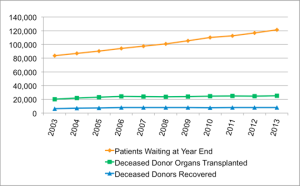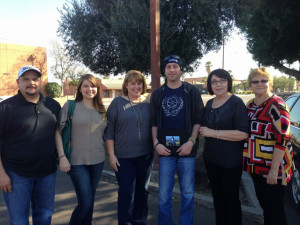
At age 15, Nick Korte came home with his driving learner’s permit, nagging his parents for consent to become an organ donor at the first opportunity.
Five years years later, on Nov. 9, 2012, he was brain dead in the hospital with a gunshot wound to his head. His persistence to donate became his legacy.
“We knew that [organ donation] was something that he wanted,” Caitlin Korte said, recounting the day her family decided to donate Nick’s organs. His death would ultimately go on to help 75 other people through organ and tissue donations.
According to Donate Life AZ which handles the organ donor registry for Arizona, about 54 percent of citizens (2.6 million) in the state are registered organ donors, a rate that nearly doubles the national average. Yet life-saving organ donation is still at a premium in the state and nationwide. There are currently 2,342 candidates on the waiting list for complete-organ transplants in the state, the vast majority (1,957) needing kidneys. The average waiting time in is roughly 38 months for a kidney in Arizona.
Despite high rates of willingness to donate, deceased donors are still the best and most numerous candidates for kidney donation, and frankly not enough people die in a way conducive to donating organs, like Nick Korte.

A total of 158 Arizonans saved 427 lives through organ donation in 2014, according to Jacqueline Keidel of Donate Life AZ. That is only 18 percent of the people currently awaiting organ transplant, and the waiting list continues to grow at a rate faster than the list of eligible donors.
Nationally an average of 21 people die everyday awaiting organ transplants according to the Organ Procurement and Transplant Network, part of the U.S. Department of Health and Human Services
Why is the amount of people on the organ donation list going up so rapidly? Currently, there are 122,531 people awaiting organ donations nationally. Many point to the obesity epidemic as the culprit. The most common diagnosis of people on the national transplant list for kidneys is type II diabetes with 29,736 people. This followed closely by hypertensive nephrosclerosis, which is high blood pressure which causes renal failure, at 21,899 cases. Both of these diagnoses are most commonly caused by being overweight, called obesity related comorbidities. These two diseases by themselves make up over half of the national organ donor registry waiting list.
For the Korte family, the recipients of their son and brother’s organs represent a living legacy. The family remains in contact, and are good friends, with Nick’s double lung recipient Jaken Kasper.

“Our mother’s still text each other everyday,” Korte said. Many people ask her why she stays in contact with the people who have her brothers organs, saying it’s just dragging out the death of her brother.
“They don’t understand that I get to see these people living and breathing because of what my brother did,” Korte said. Kasper’s original lung transplant from Nick was rejected by his body, but he received a second transplant shortly after. Despite this, Korte is adamant that they made the right decision to donate Nick’s organs
“It’s our only silver lining,” Korte said, “If he hadn’t made the decision [to become an organ donor] and we hadn’t followed through with it, he just would’ve died. That would’ve been the end of it.”
Tanner Clinch is a reporter for Arizona Sonora News, a service from the School of Journalism with the University of Arizona. Contact him at [email protected]
Click here for a Word version of this story and high-resolution photos

